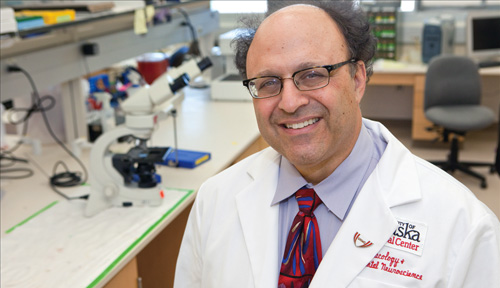Grants will study HIV, gout, cell signaling
Twenty-six new research awards representing more than $2.8 million in new funding were received by College of Medicine faculty during the past month. They included:
Howard Fox, M.D., Ph.D., pharmacology and experimental neuroscience, has received a National Institutes of Health U24 grant from the National Institutes of Mental Health (NIMH). This $883,000 award designates Dr. Fox and UNMC as the data coordinating center to the National NeuroAIDS Tissue Consortium (NNTC), a resource for investigators conducting NeuroAIDS research to identify the neuropathogenic mechanisms involved in HIV disease of the central and peripheral nervous systems. Investigators using this resource examine emerging research topics in the NeuroAIDS field such as: (a) eradication of HIV from persistent CNS reservoirs; (b) pathogenic mechanisms of HIV-associated neurocognitive disorders (HAND) in setting of long-term Highly Active Antiretroviral Therapy (HAART); and (c) HIV and aging.
Nora Sarvetnick, Ph.D., director of the Mary and Dick Holland Regenerative Medicine Program and professor, surgery-transplant, will be the UNMC lead for a $260,000 collaborative research project translating cellular markers of diabetes from existing immunophenotyping techniques to new mass cytometry technologies. Mass cytometry combines the single cellular imaging power of flow cytometry with the proteomics strategies of mass spectrometry increasing the amount of information that can be determined from very small samples. Dr. Sarvetnick will apply this technology to the discovery of novel immunological markers in pediatric diabetes patients.
Paul Sorgen, Ph.D., biochemistry and molecular biology, is the UNMC lead for a National Institutes of Health, National Institute of General Medical Sciences (NIGM) funded project initiated through the University of Medicine and Dentistry of New Jersey. This $135,000 project will explore the mechanisms by which intercellular molecular signaling throughout the body is modulated. Defects in cellular signaling are responsible for a number of human pathologies. Understanding these mechanisms will contribute to the design of interventions for these defects.
Ted Mikuls, M.D., internal medicine-rheumatology, is the UNMC lead for a National Institutes of Health, National Institute of Arthritis and Musculoskeletal and Skin Diseases (NIAMS) program project grant. This $120,000 award will compare the effectiveness of a novel pharmacy-based “virtual” Gout Clinic that includes protocol-driven care to usual care in the treatment of chronic gout. This study hopes to address the current gaps in the quality of care for gout patients by furthering the understanding of the genetic and environmental influences on gout and hyperuricemia in different races and ethnicities.
Angela Hewlett, M.D., internal medicine-infectious diseases, is the recipient of a National Strategic Research Institute (NSRI) award. Dr. Hewlett will be developing surveillance assays for the diagnosis of microbial contamination.
The American Heart Association awards pre- and post-doctoral fellowships to help trainees initiate careers in cardiovascular and stroke research while obtaining significant research results under the supervision of a mentor. The following investigators have received American Heart Association (Midwest Affiliate) fellowship awards:
- Jinu Kim, Ph.D., cellular and integrative physiology, has received a post-doctoral fellowship for his work titled “Antifibrotic Mechanism of Soluble Epoxide Hydrolase Inhibition in Chronic Kidney Disease.”
- Adam Case, Ph.D., cellular and integrative physiology, has received a post-doctoral fellowship for his work titled “Regulation of Mitochondrial Redox Systems in T-lymphocytes During Hypertension”.
- Cortney Heim, pathology and microbiology, has received a pre-doctoral fellowship for her work titled “Role of myeloid-derived suppressor cells (MDSCs) in Staphylococcus aureus biofilm persistence.”
- Peter Pellegrino, cellular and integrative physiology, has received a pre-doctoral fellowship for his work titled “Central Rho-kinase Inhibition and Ang II-Induced Sympatho-excitation.”
Each year the Nebraska Department of Health and Human Services funds grant programs focused on reducing cancer and smoking-related heart disease. LB506 funds proposals directly related to the prevention of cancer and smoking-related diseases or for the prevention or cessation of smoking in racial and ethnic minorities. This year, College of Medicine researchers received six LB506 awards:
- Melissa Teoh-Fitzgerald, Ph.D., biochemistry and molecular biology – “Oxidative regulation of HGF/c-Met in breast cancer.”
- Pi-Wan Cheng, Ph.D., biochemistry and molecular biology – “ER retention of glycosyltransferases in cancer cells”
- Kaustubh Datta, Ph.D., biochemistry and molecular biology – “Neuropilin-2 axis in prostate cancer bone metastasis.”
- Stephen Rennard, M.D., internal medicine-pulmonary – “MicroRNA Containing Microparticles in COPD.”
- Hesham Basma, Ph.D., internal medicine-pulmonary – “Micro RNAs (miRNAs) Modulate Epigenetic Changes in COPD Fibroblasts.”
- Kai Fu, M.D., pathology and microbiology – “Targeting Cell Metabolism for the treatment of Aggressive B-cell lymphomas.”
